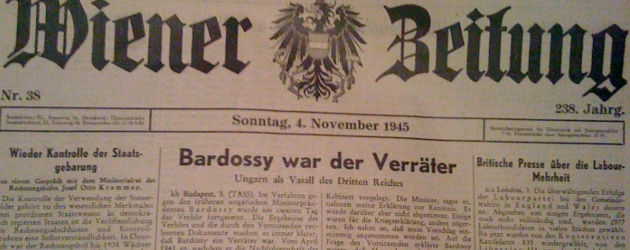Amateur history nerd that I am, I’m quite pleased to have married into a family which has retained all sorts of books, newspapers and magazines dating from about 1920 onwards. The “In the Hausarchiv” series gives an occasional look at the things I’ve come across in our own “house archive”.
Today’s “In the Hausarchiv” features the Tuesday, 13 November 1945, edition of the Viennese newspaper the Wiener Zeitung. We have a bunch of issues of this newspaper in the Hausarchiv; the earliest I’ve found so far is from 4 November 1945.
Today I set out on a special mission in my quest to find a topic for the Hausarchiv series: find the earliest mention — amongst the stack ofWiener Zeitung editions that we have — of the scope of the killing of Jews under National Socialism. It didn’t take long. As I mentioned, the oldest edition we have is from 4 November 1945, and I found within the 13 November 1945 edition the following quote:
3 Millionen jüdische Frauen und Kinder wurden von deutscher Hand erschossen oder starben den Tod in den Gaskammern.
3 million jewish woman and children were shot by German hands or perished in the gas chambers. [my translation]
An article titled “Die unverschämste Propagandalüge” (“The most shameless propaganda lie”) contains the quote. The shameless lie it speaks of is: “Wenn der Führer das wüßte” (“If only the Führerknew”). The idea here is that apologists for Hitler were (and are!) fond of saying that the likes of Goebbels and Himmler tricked Hitler or hid the truth from him. “If only the Führer knew”, then he would have put a stop to the barbarity! The article scorns this view and tells of one Eugen Kumming, a former head translator within the Wehrmacht, who had just written an article for the Sudetendeutschen Zeitung in which he mentions the 3 million “jewish women and children” referenced above. He also tells the following stories:
Im April 1941 teilte ihm [Kumming] ein Oberstleutnant von Bodecker mit, daß SS-Verbände jüdische Frauen und Mädchen in Warschau zusammentrieben und sie nackt im 4. Stock eines Hotels eingesperrt hatten. Tagelang waren sie Opfer wiederholter Schändungen und wurden schließlich durch das Fenster auf die Straße geworfen. Ein Oberstleutnant Mauck berichtet, daß er gesehen habe, wie SS und SD-Angehörige über 1500 Juden bis zum Halse in einen Sumpf in der Nähe von Solotschew getrieben und sie dort als lebendige Zielscheibe benutzt hätten.
A certain lieutenant-colonel von Bodecker told him [Kumming] in April 1941 that SS troops had rounded up some Jewish women and girls and locked them up, naked, on the fourth floor of a hotel in Warsaw. These women and girls were raped for days and then thrown out of windows on to the street. Another lieutenant-colonel, a certain Mauck, reported that he’d seen how SS and SD members in Solotschew had placed 1500 Jews up to their necks in a swamp and used them as live targets for practice.
So why was I searching for the earliest mention of the Holocaust that I could find within our stack of Wiener Zeitung editions? Because David Irving has come out again from under his rock — this time actually invited, I’m sorry to report — and had the following to say about the alleged jewish manufacturing of “Holocaust”:
Until the 1970s [the Holocaust] was just a speck of dust on the horizon … The proof is that it doesn’t appear in any of the biographies of the great leaders of the Second World War. But from then on it became fashionable. The Jews turned it into a brand, using the same technique as Goebbels. They invented a slogan… and repeated it ad nauseam.
Now I realize he’s not exactly saying that nobody reported on mass extermination of Jews prior to the 1970s, but his suggestion that it wasn’t on the radar prior to then made me want to find the earliest mention of it that I could. And so I found it, printed in an Austrian newspaper just seven months after the defeat of Nazi Germany. Someone was apparently paying attention long before the 1970s.
I’ll have a larger post about David Irving on Thursday. In the meantime, I’ll just say that it’s kind of an interesting coincidence that I found this particular article which, as I explained above, is centered around the lie of “If only the Führer knew”: a coincidence because David Irving, as you’ll see in my Thursday post, is guilty of precisely that lie.



